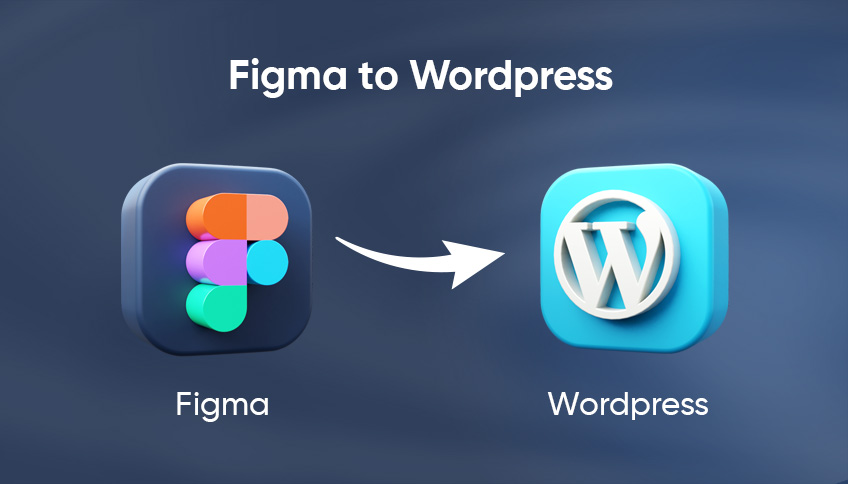Figma to WordPress transition is available to a number of companies. Here is everything about the process to offer a better understanding
How to Make Figma to WordPress Transition Easy?
You have hold of Figma but still not able to navigate easily by the complexity of the platform? What if we take you through a way to convert Figma to WordPress? Converting to WordPress offers a number of benefits. The most exclusive one comes in the form of custom WordPress development services. However, before we get into the details, let’s start with why even consider Figma and WordPress at all?
Figma and WordPress As Two Biggest Tool
Figma is exceptional for designers to show their creativity. Among a number of benefits that creative Figma platform offers, allowing teamwork is great. The tool can help designers collaborate on a project, which is a great advantage.
The creative tool helps designers to create prototypes, add functionality on existing elements and do so many other things. However, figuring out how to make a full-fledged website is a whole new topic of discussion.
On the other hand, WordPress is easy to use even for beginners. Added to that, the platform has so much to offer that it makes sense to try it out.
Talking specifically about conversion from Figma to WordPress, the process may seem a tough one for many. And when it comes to doing the things manually, the task becomes tougher. Manual recreation means doing everything again that are already done. Therefore, to lessen the task for you, here is the procedure.
Now Let’s have the Options to Consider!
Option 1
The very first option involves website development, the steps of which involves the following:
- To create the fundamental of website, you require files for structure, feature set-up or in other words the following:
- php
- css
- js
- Now it is the time to build the basics in those files. This would include creating headers and footer and functions of the search bar, interrelating one to another.
NOTE: Creating the site would require an in-depth understanding of PHP, HTML, CSS, JacaScript and more. However, there is an option of exporting CSS from Figma, it won’t be simpler than other two.
- Now is the time to exporting images from Figma project and placing them in yur future site directory.
- Call them where it is needed
- Keep checking the result at every other step
Option 2
It is the process of using WordPress theme that requires working slowly and patently.
Note: The very step includes searching a WordPress theme that could meet the requirement and could replicate the look and the feel of the website. Now let’s suppose you have got a similar theme. After that the following process follows:
- This step involves juggling a lot with CSS. This involves copy pasting the exported .css of the design element to the WordPress theme style.css and comparing the outcome with the goal.
- Now is the time to add element and functionality, which will take time. For the right result, you need to ensure everything is at the right place.
RESULT
The result will be a customised theme having all the preferences that you would like to have. There is one more option that we will explain further. Opting this way will ensure you have saved time and now there is no need to use Figma.
Pros and Cons of Different Figma to WordPress Conversion
- Choosing a service provider
The Pro
High-quality resultS tailored to specific business requirements to suit brand value.
The con
This method can be expensive and demands careful vetting to find a reliable and reputable provider that fits your budget and timeline.
- Using Figma Plugin and AI Tool
The Pro
Using advanced tools, it becomes easier to quickly generate WordPress code from Figma design.
The Con
They may offer limited customisation options, and the output might not always perfectly match the original design. Users must also ensure the security and reliability of the chosen plugins and tools before integration.
- Using Page Builder for Figma to WordPress Conversion
The Pro
When making use of the page builder for Figma to WordPress conversion, the process offers flexibility in design and layout creation. This also allows easy customization.
The Con
Mastering the page builder can present a learning curve, and the final result may not be as lightweight or optimized as hand-coded solutions.
- Converting Figma to WordPress Using Premade Themes
The Pro
Using Premade themes for converting Figma to WordPress allows quick setup as pre-designed templates are already available. These themes have built-in functionality that reduces the requirement for further customization.
The Con
Customisation options may be limited, and the final design might not perfectly match the original Figma design. Users also need to carefully choose a theme that meets their project requirements and desired aesthetic.
- The HTML Process of converting Figma design to WordPress
The Pro
This offers complete control over design and functionality. By hand-coding HTML and CSS, it becomes easier to ensure pixel-perfect fidelity to the original design.
The Con
This method is time-consuming and requires coding expertise. Additionally, integrating HTML code into WordPress can lead to compatibility issues, and updates may necessitate manual adjustments, potentially increasing maintenance efforts.
In Conclusion
When converting your site from Figma to WordPress, it then requires regular WordPress website maintenance. Services from a reliable WordPress development company can help with exceptional outcomes when it comes to keeping the site up-to-date. Talking particularly about Figma to WordPress conversion, the services are too available with various companies. However, it is good to consider companies that have good years of experience in providing similar assistance.












